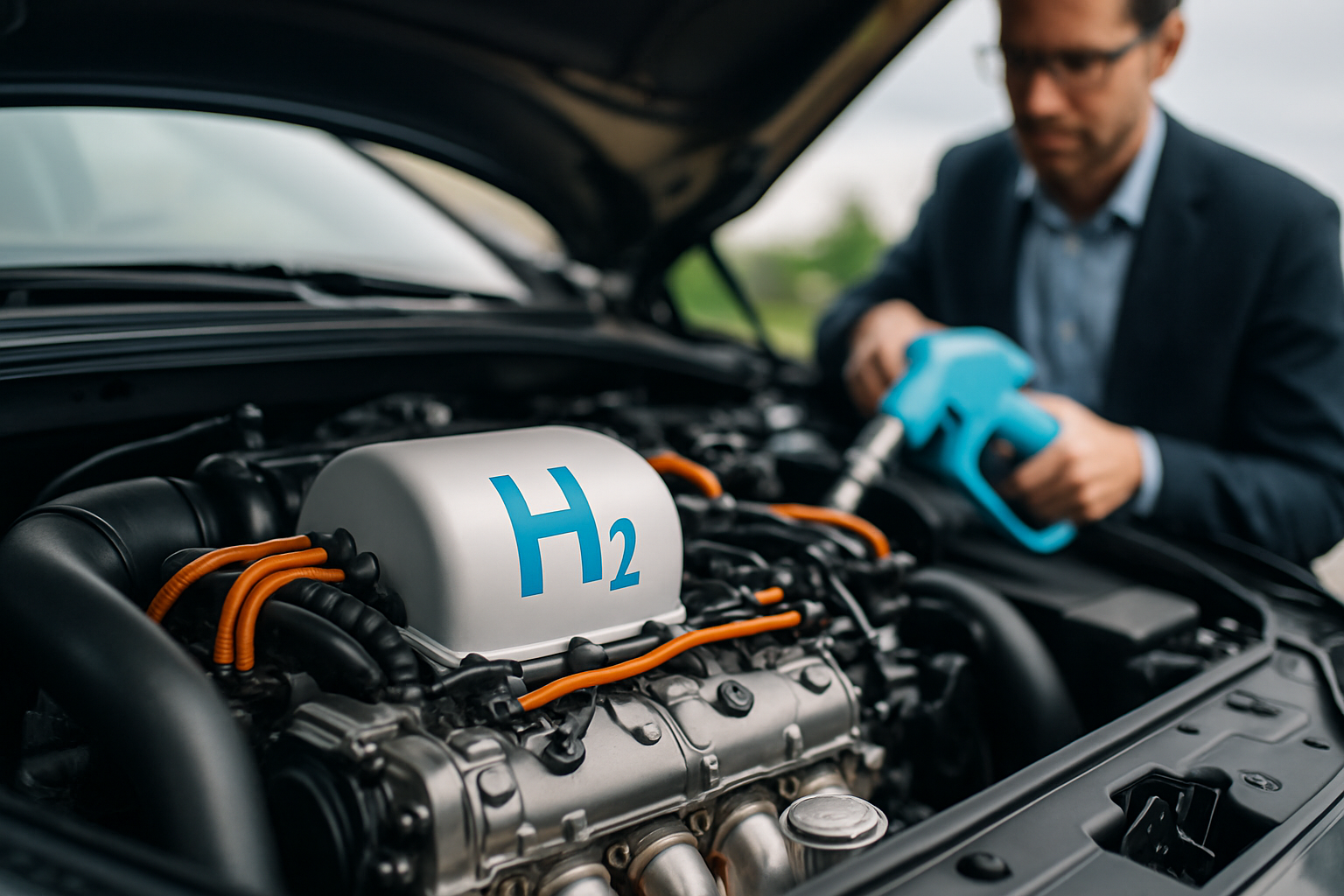Hydrogen Fuel Cell Vehicles: The Silent Revolution
In the ever-evolving landscape of automotive technology, a quiet yet powerful contender is emerging: hydrogen fuel cell vehicles. These cutting-edge machines promise to reshape our understanding of sustainable transportation, offering a compelling alternative to traditional fossil fuel-powered cars. As the world grapples with climate change and seeks cleaner energy solutions, hydrogen fuel cell vehicles stand at the forefront of innovation, poised to redefine the future of mobility.

The technology behind hydrogen fuel cells is both elegant and efficient. Hydrogen stored in the vehicle’s tanks combines with oxygen from the air in a fuel cell stack. This chemical reaction produces electricity, which is then used to power the vehicle’s electric motors. The result is a clean, quiet, and powerful driving experience that rivals traditional gasoline-powered cars in performance and range.
A Brief History of Hydrogen in Automotive Applications
The concept of using hydrogen as a fuel source for vehicles is not new. In fact, the first hydrogen-powered internal combustion engine was developed as far back as 1807 by François Isaac de Rivaz. However, it wasn’t until the late 20th century that serious efforts to develop hydrogen fuel cell vehicles began to take shape.
In the 1960s, General Motors experimented with hydrogen fuel cells in their Electrovan concept. This early prototype demonstrated the potential of hydrogen as a clean energy source for vehicles. The following decades saw increased research and development in hydrogen fuel cell technology, with major automakers investing heavily in this promising field.
The turn of the millennium marked a significant milestone for hydrogen fuel cell vehicles. In 2002, Honda introduced the FCX, the world’s first commercially available fuel cell vehicle. This groundbreaking car paved the way for future hydrogen-powered models and sparked renewed interest in the technology across the automotive industry.
The Current State of Hydrogen Fuel Cell Technology
Today, hydrogen fuel cell vehicles have made significant strides in terms of performance, reliability, and practicality. Several major automakers, including Toyota, Honda, and Hyundai, have introduced hydrogen fuel cell models to the market. These vehicles offer impressive ranges, often exceeding 300 miles on a single tank of hydrogen, and can be refueled in a matter of minutes, comparable to traditional gasoline-powered cars.
One of the most notable advancements in hydrogen fuel cell technology is the reduction in production costs. As manufacturing processes become more efficient and economies of scale come into play, the price of fuel cell systems has decreased dramatically. This trend is expected to continue, making hydrogen fuel cell vehicles more accessible to a wider range of consumers in the coming years.
Infrastructure Challenges and Solutions
Despite the promising technology, one of the biggest hurdles facing hydrogen fuel cell vehicles is the lack of refueling infrastructure. Unlike electric vehicles, which can be charged at home or at widely available public charging stations, hydrogen refueling stations are still relatively scarce in most parts of the world.
However, efforts are underway to address this challenge. Countries like Japan, Germany, and South Korea are investing heavily in hydrogen infrastructure, with plans to significantly increase the number of refueling stations in the coming years. In the United States, California has taken the lead in hydrogen infrastructure development, with over 40 operational stations and plans for many more.
The development of innovative refueling technologies is also helping to overcome infrastructure challenges. Mobile hydrogen refueling stations and on-site hydrogen production facilities are emerging as potential solutions to expand the reach of hydrogen fuel cell vehicles beyond major urban centers.
Environmental Impact and Sustainability
One of the most compelling arguments for hydrogen fuel cell vehicles is their potential to dramatically reduce greenhouse gas emissions. When powered by hydrogen produced from renewable sources, such as solar or wind energy, these vehicles offer a truly zero-emission transportation solution.
However, it’s important to note that the environmental benefits of hydrogen fuel cell vehicles depend largely on how the hydrogen is produced. Currently, most hydrogen is derived from natural gas through a process called steam methane reforming, which does produce some carbon emissions. The challenge moving forward is to increase the production of green hydrogen, made through the electrolysis of water using renewable energy sources.
The Role of Hydrogen in Heavy-Duty Transportation
While much of the focus on hydrogen fuel cell technology has been on passenger vehicles, the technology shows even greater promise in the realm of heavy-duty transportation. Long-haul trucks, buses, and even trains powered by hydrogen fuel cells are already in development or early stages of deployment.
For these applications, hydrogen fuel cells offer significant advantages over battery-electric alternatives. The high energy density of hydrogen allows for longer ranges and shorter refueling times, critical factors in commercial transportation. Additionally, the weight of large battery packs can be a limiting factor for heavy-duty vehicles, making hydrogen a more attractive option for long-distance hauling.
The Future of Hydrogen in the Automotive Industry
As we look to the future, hydrogen fuel cell technology is poised to play an increasingly important role in the automotive industry. While battery-electric vehicles have gained significant traction in the passenger car market, hydrogen fuel cells offer a complementary solution, particularly for long-range and heavy-duty applications.
The continued development of hydrogen production and distribution infrastructure will be crucial to the widespread adoption of fuel cell vehicles. As this infrastructure grows, we can expect to see a broader range of hydrogen-powered vehicles on the roads, from compact city cars to long-haul trucks.
Moreover, advancements in fuel cell technology continue to improve efficiency, durability, and cost-effectiveness. Research into new materials and manufacturing techniques promises to make hydrogen fuel cells even more competitive with traditional powertrains in the coming years.
In conclusion, hydrogen fuel cell vehicles represent a promising pathway towards sustainable transportation. While challenges remain, particularly in terms of infrastructure development, the potential benefits of this technology are too significant to ignore. As we move towards a cleaner, more sustainable future, hydrogen fuel cell vehicles are likely to play a crucial role in reshaping the automotive landscape and helping to address the global challenge of climate change.






